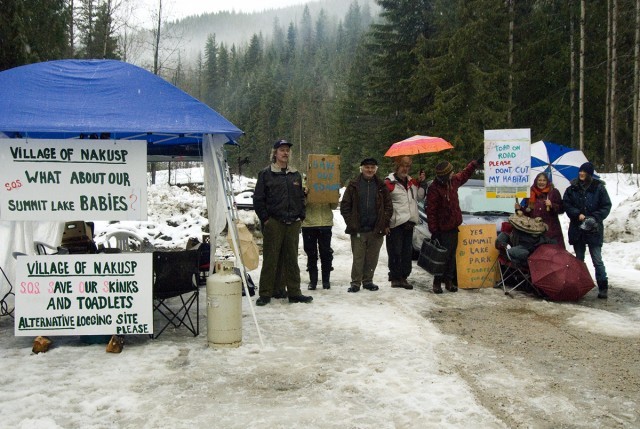Public outcry wins reprieve for threatened toads near Summit Lake
Concerns by the local residents, environmental groups and the Okanagan First Nation that proposed logging above Summit Lake Provincial Park could crush hundreds of blue-listed toads while destroying their habitat has resulted in logging being stopped until winter said Valhalla Wilderness Society (VWS) in a media release Wednesday.
The VWS said the decision was apparently made by the logging company — the Nakusp and Area Community Forest (NACFOR) — but was released to the local environmental society by the Ministry of Forests, Lands and Natural Resource Operations (MFLNRO).
“Logging at this time would not have been Best Management Practices, it would have been Worst Possible Management Practices,” said Craig Pettitt, a director of the Valhalla Wilderness Society in the media release.
Locals have been protesting since last winter when logging began.
Pettitt said earlier this year, in response to the protests of numerous local residents, NACFOR and the government told the public that the logging would use “Best Management Practices” to minimize damage to toads and their habitat.
This included logging only in winter, when the toads would be hibernating.
However, VWS said NACFOR began grading the road in May and brought in a feller-buncher when hundreds, if not thousands, of yearling toads were dispersing up the slope from Summit Lake to their habitat in the forest.
The VWS immediately notified MFLNRO and the Conservation Officer Service that masses of toads were in the area.
In a complaint to the Forest Practices Board, VWS requested an investigation into whether knowingly killing the toads would violate BC wildlife laws. Wilderness Committee (WC), VWS and public donors co-sponsored a local videographer to provide video evidence, which was released to the media.
The VWS said Jim Guido, the Resource Manager for the Selkirk District inspected the area with NACFOR on May 31 and found “numerous” toads.
They then attended a meeting of MFLNRO managers and operations staff to discuss the “Best Management Practices” and the wildlife laws.
On June 1st NACFOR informed the Ministry that it would cancel the summer harvest and likely return to log this winter.
The VWS said it was informed by the Ministry in an email, also stating that they found no violation of BC wildlife laws, but that question would be decided by the Conservation Officer Service and the Forest Practices Board.
“Best Management Practices will not save the toads,” Pettitt explained.
“Logging in winter may reduce the damage on the ground, but hibernating toads will still be killed; and with the forest overstory removed by clearcutting, these areas will be exposed to the sun and dry out in summer, making them uninhabitable for the toads.“
VWS director and professional wildlife biologist Wayne McCrory said the government already has a Section 16 reserve on the books to significantly expand the boundary of Summit Lake Provincial Park.
“It would be a very easy thing for the government to adjust the proposed park addition to include the core terrestrial habitat where Summit Lake toads spend 95% of their lifetimes,” McCrory said.
“This would require an addition to the reserve of only about 670 hectares to protect this species at risk. “The government bends over backwards to revise park boundaries for industry such as oil and gas pipelines, but for the lack of a 670-hectare park expansion, when winter comes these toads may yet have significant additional mortalities heaped on them from logging.
“That would be a travesty.”
























